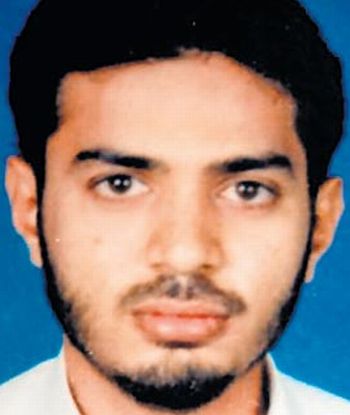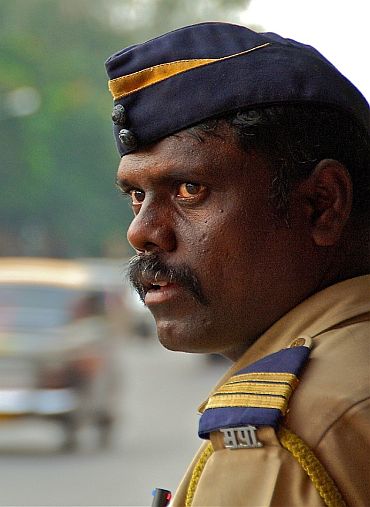Sahim Salim in New Delhi
Suspected Indian Mujahideen operative Salman alias Chotu, who was arrested by the Uttar Pradesh Anti Terrorism Squad in March last year from near the Nepal border, had confessed to investigating agencies that the group was planning a major comeback and had strike plans for different cities, including Mumbai.
So, why was intelligence not further developed to thwart a possible attack?
Salman, who hails from Azamgarh and is an accused in the 2008 serial bombings in Delhi, is also suspected to be behind the blasts in Gorakhpur, Varanasi, Ahmedabad and Jaipur.
During his confession, Salman had told police that since multiple modules of the IM had been busted, he had been instructed by IM founder Riyaz Bhatkal to make new recruitments.
Sources said that the operative revealed that Bhatkal wanted to strike Mumbai as soon as possible.
...
Special inputs were given to southern and western states
Image: A police patrol van"Since more than 60 IM operatives were arrested in various crackdowns across the country by different anti terrorist squads, the group was short on operatives. So Bhatkal had asked Salman to carry out recruitments across the country through its various sleeper cells," a senior police officer of the special cell, who was involved in his interrogation told rediff.com.
Asked why the input was not further developed, the officer said, "We did develop it. Intelligence agencies were briefed and the input was circulated among all the anti-terrorist squads in the country."
"It was also revealed that recruitments would take place largely in southern and western India and we had given special inputs to the forces of these states. But since many of their operatives were arrested because of technical surveillance, they had become cautious."
"They used phones and e-mails minimally and communicated mostly face to face. One thing we know about them is that their ability to research. Through the various news-items of arrests of their members, they must have realised that technical surveillance leads to arrest and they became cautious."
The calm is shattered. That's worrying
Image: A Mumbai police constable on dutyThe officer said that technical surveillance had been mounted across India, but there was no successful input about the group's specific plans.
"All we had was Salman's statement that they were planning to carry out attacks in Mumbai and other cities. Most of these recruitments are done by sleeper cells. These cells coordinate among themselves only face to face. So despite surveillance on their e-mails, phones and social networking sites, no specifics emerged," the officer said.
What is especially worrying for security forces is that the relative calm following 26/11 seems to have shattered.
Indian Mujahideen is believed to plan and execute a string of attacks across the country at regular intervals.
Like in 2008, the group is believed to have carried out serial blasts in Jaipur, Bangalore, Ahmedabad and Delhi.
This could very well be a signal for a series of attacks
"When you look at Delhi itself, security has been beefed up to the maximum. Discreet enquiries are being carried out and sources are being developed across the city. Random vehicle checks and tenant verifications are being carried out."
"The Internet is being scanned by the Cyber Cell round the clock for possible encrypted messages between groups because they (the group) don't seem to be using any other kind of communication," he added.





article